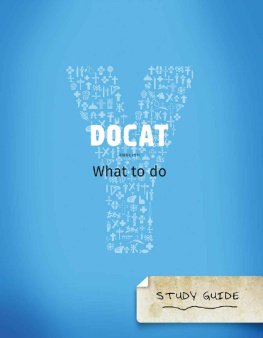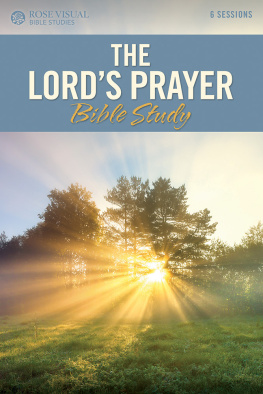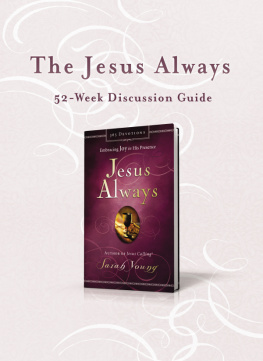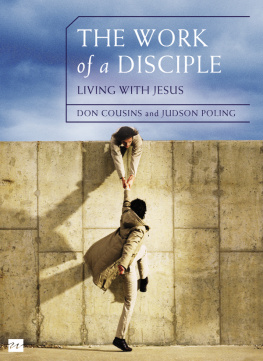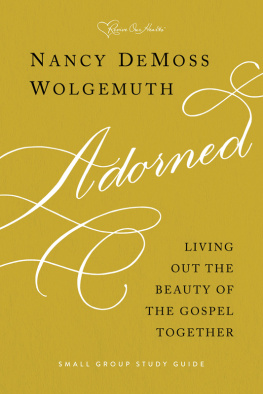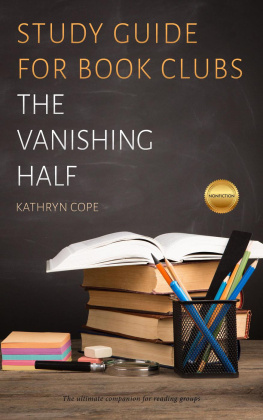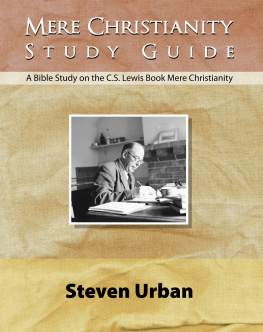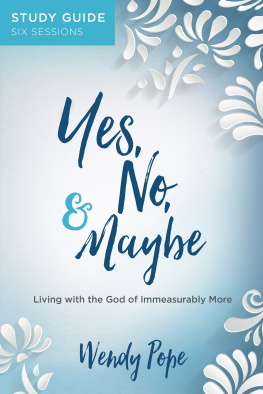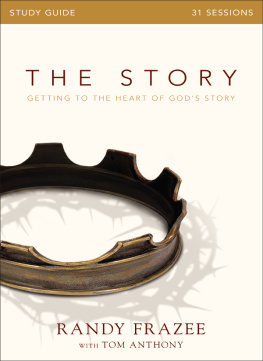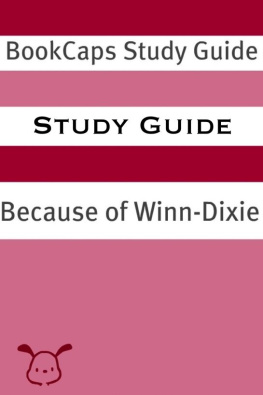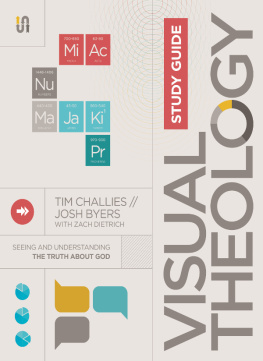DOCAT Study Guide
Here you can read online DOCAT Study Guide full text of the book (entire story) in english for free. Download pdf and epub, get meaning, cover and reviews about this ebook. year: 2016, publisher: Ignatius Press, genre: Religion. Description of the work, (preface) as well as reviews are available. Best literature library LitArk.com created for fans of good reading and offers a wide selection of genres:
Romance novel
Science fiction
Adventure
Detective
Science
History
Home and family
Prose
Art
Politics
Computer
Non-fiction
Religion
Business
Children
Humor
Choose a favorite category and find really read worthwhile books. Enjoy immersion in the world of imagination, feel the emotions of the characters or learn something new for yourself, make an fascinating discovery.
DOCAT Study Guide: summary, description and annotation
We offer to read an annotation, description, summary or preface (depends on what the author of the book "DOCAT Study Guide" wrote himself). If you haven't found the necessary information about the book — write in the comments, we will try to find it.
Unknown: author's other books
Who wrote DOCAT Study Guide? Find out the surname, the name of the author of the book and a list of all author's works by series.
DOCAT Study Guide — read online for free the complete book (whole text) full work
Below is the text of the book, divided by pages. System saving the place of the last page read, allows you to conveniently read the book "DOCAT Study Guide" online for free, without having to search again every time where you left off. Put a bookmark, and you can go to the page where you finished reading at any time.
Font size:
Interval:
Bookmark:
What to do?
The Social Teaching
of the Catholic Church
Ignatius Press Augustine Institute
San Francisco, CA Greenwood Village, CO
Nihil Obstat: Dr . Jared Staudt, B.A., M.A., Ph.D., Censor Deputatus Imprimatur : Most Rev. Samuel J. Aquila, S.T.L., Archbishop of Denver, Colorado, USA, June 20, 2016
Copyright 2016 by Ignatius PressAugustine Institute. All rights reserved. With the exception of short excerpts used in articles and critical reviews, no part of this work may be reproduced, transmitted, or stored in any form whatsoever, printed or electronic, without the prior permission of the publisher.
The Scripture verses contained herein are from the Revised Standard Version New Testament, copyright 1946; Old Testament, copyright 1952; the Apocrypha, copyright 1957. Revised Standard Version Bible, Catholic Edition, Copyright 1965, 1966, Division of Christian Education of the National Council of the Churches of Christ in the United States of America. Revised Standard Version Bible, Ignatius Edition, Copyright 2006, Division of Christian Education of the National Council of the Churches of Christ in the United States of America. All rights reserved.
English translation of the Catechism of the Catholic Church for the United States of America, copyright 1994, United States Catholic Conference, Inc.Libreria Editrice Vaticana. English translation of the Catechism of the Catholic Church : Modifications from the Editio Typica copyright 1997, United States Catholic Conference, Inc.Libreria Editrice Vaticana.
Use of the cover design and logo of DOCAT with kind permission of the YOUCAT Foundation gGmbH, Konigstein/Ts., Germany. YOUCAT is an internationally registered and protected brand name and logo. Filed under GM: 011929131 Design, layout, illustrations: Alexander von Lengerke, Cologne, Germany.
Writer: Ashley Crane.
Print Production / Graphic Design: Jeff Cole, Ann Diaz, Christina Gray,
Brenda Kraft, Devin Schadt.
Ignatius Press Distribution
P.O. Box 1339
Fort Collins, CO 80522
Tel: (800) 651-1531
www.ignatius.com
Augustine Institute
6160 South Syracuse Way, Suite 310
Greenwood Village, CO 80111
Tel: (866) 767-3155
www.AugustineInstitute.org
Printed in the United States of America
ISBN: 978-1-62164-136-0(PB)
ISBN 978-1-68149-725-9 (EB)
TABLE OF CONTENTS

The social doctrine of the Catholic Church contains a wealth of resources for how to live out the faith in pursuit of charity and justice. DOCAT presents this social doctrine of the Church in a way designed specifically for young adults, helping you to respond effectively to Pope Franciss challenge to work for greater justice in the world.
Based on the Catechism of the Catholic Church and other important Church documents, DOCAT is written in a style and format just for you. Through probing questions and thought-provoking exercises, DOCAT teaches how to understand and joyfully live according to the principles of truth, justice, and charity set forth in the social doctrine of the Church.
The truths of the faith are not meant to be merely an intellectual exercisethey are meant to make a real, tangible difference in daily life. As Jesus tells his Apostles at the Last Supper, By this all men will know that you are my disciples, if you have love for one another (John 13:35).
What does this love look like? It is loving your neighbor as yourself and praying for those who persecute you (cf Matthew 5:44). It is giving food to the hungry and drink to the thirsty, welcoming the stranger, clothing the naked, and visiting the sick and imprisoned. Love of God cannot be separated from service to others because when you care for others, you are serving God (cf Matthew 25:34-40).
Translated into multiple languages and distributed throughout the world, DOCAT can have a profound effect on young Catholics everywhere. By learning to live a life transformed by Gods love, we can then, in turn, transform the world.
HOW TO USE THE STUDY GUIDE
The Study Guide is divided into the same twelve parts as DOCAT, which reflect twelve important categories of Catholic social doctrine. Though the parts can be studied in any order, it is best to let the Study Guide lead you through DOCAT by starting at the beginning.
The twelve sections of DOCAT and this Study Guide explain what the Church teaches about the dignity of the human person and what that means for all areas of life, from the family to the international community to economics, politics, and the environment. For each of these sections, the Study Guide has three topics for study, discussion, further reflection, and application in your daily life.
Youll find the same format for each topic. First youll dive into DOCAT, starting with a brief introduction to the topic (Behind DOCAT), followed by a reading assignment (Read DOCAT) and short-answer questions (What Does DOCAT Say?). Youll notice that in the numbered paragraphs and along the margins of DOCAT are quotations from the Bible. To help you read and reflect on these, weve included questions about those passages, as well as some other important Bible texts (What Does the Bible Say?). Next, youll find some questions to reflect on, either independently or as a group (DO Reflect), followed by discussion questions for either large or small groups (DO Chat). Finally, weve provided some tasks for you to do in the coming week to help you apply what youve learned (DO Challenge).


Behind DOCAT
Who is God, and how are we supposed to relate to him? If we dont get this fundamental question right, we wont get anything else right either. In order to understand our role in this world and know how to relate to others in truth and love, we must first understand who God is and what that says about our own identity and purpose.
Read DOCAT
Read nos. 1-5.
What Does DOCAT Say?
1. What is the red thread running through Gods creation, according to no. 1? What does this tell us about Gods plan of creation?
2. According to no. 3, how can we recognize what good actions are?
3. Why did God create us?
What Does the Bible Say?
1. How does 1 John 4:7-12 explain the relationship between loving God and loving others?
2. Read Matthew 5:43-48. By what standard are we supposed to measure our lives? What are the criteria?
Do reflect
God created this world because of his great love. He is the origin, cause, and goal of all things that exist. This means that God cares about everythingnothing is too small for his notice. So every moment of our lives, every decision that we make, every thought that we have matters to God. Not because he is some control-freak who just wont leave us alone but because he loves us! And God wants us to love him in return because he created us to love him, and so, he knows that loving him is what is going to make us truly happy. Yes, God really does want us to be happy. And the path to true happiness is love.
(1) Do you believe that God cares about every detail of your life? What difference does it make whether he does or doesnt?
(2) Do you believe God created everything because of love? If not, why else would God create the world and all that is in it?
(3) What do you think the purpose of all of creation is? What do you think your purpose in life is?
Font size:
Interval:
Bookmark:
Similar books «DOCAT Study Guide»
Look at similar books to DOCAT Study Guide. We have selected literature similar in name and meaning in the hope of providing readers with more options to find new, interesting, not yet read works.
Discussion, reviews of the book DOCAT Study Guide and just readers' own opinions. Leave your comments, write what you think about the work, its meaning or the main characters. Specify what exactly you liked and what you didn't like, and why you think so.

